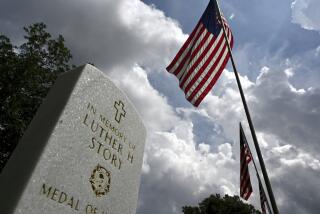Billy Walkabout, 57; Native American war hero
- Share via
HARTFORD, CONN. — Billy Walkabout, one of the most decorated Native American soldiers of the Vietnam War, has died. He was 57.
Walkabout died of pneumonia and kidney failure March 7 at a Norwich, Conn., hospital, said his stepdaughter, Randi Johnson.
She said he had been on a kidney transplant waiting list and was undergoing dialysis three times a week. She said his health issues were exacerbated by his exposure to the Agent Orange defoliant used during the war.
A Cherokee, Walkabout received the Distinguished Service Cross, a Purple Heart, five Silver Stars and five Bronze Stars, according to U.S. Department of Defense reports.
Walkabout was an 18-year-old Army Ranger sergeant when he and 12 other soldiers were sent on an assassination mission behind enemy lines on Nov. 20, 1968, in a region southwest of Hue.
They ended up coming under fire for several hours, during which Walkabout was seriously wounded. Several of the other 12 men were killed at the scene; the rest later died from their wounds.
Walkabout’s citation for the Distinguished Service Cross said he simultaneously returned fire, helped his comrades and loaded other injured soldiers onto evacuation helicopters.
“Although stunned and wounded by the blast, Sgt. Walkabout rushed from man to man administering first aid, bandaging one soldier’s severe chest wound and reviving another soldier by heart massage,” the citation states.
In a 1986 interview, Walkabout said his 23 months in Vietnam left him with disabling injuries and memories that refused to fade.
“War is not hell,” Walkabout said. “It’s worse.”
He said he struggled with failed marriages, thoughts of suicide and years of self-isolation when he would spend six months at a time alone.
Over the years, however, he found solace in Native American powwows, where he often was an honored guest.
More to Read
Sign up for Essential California
The most important California stories and recommendations in your inbox every morning.
You may occasionally receive promotional content from the Los Angeles Times.










